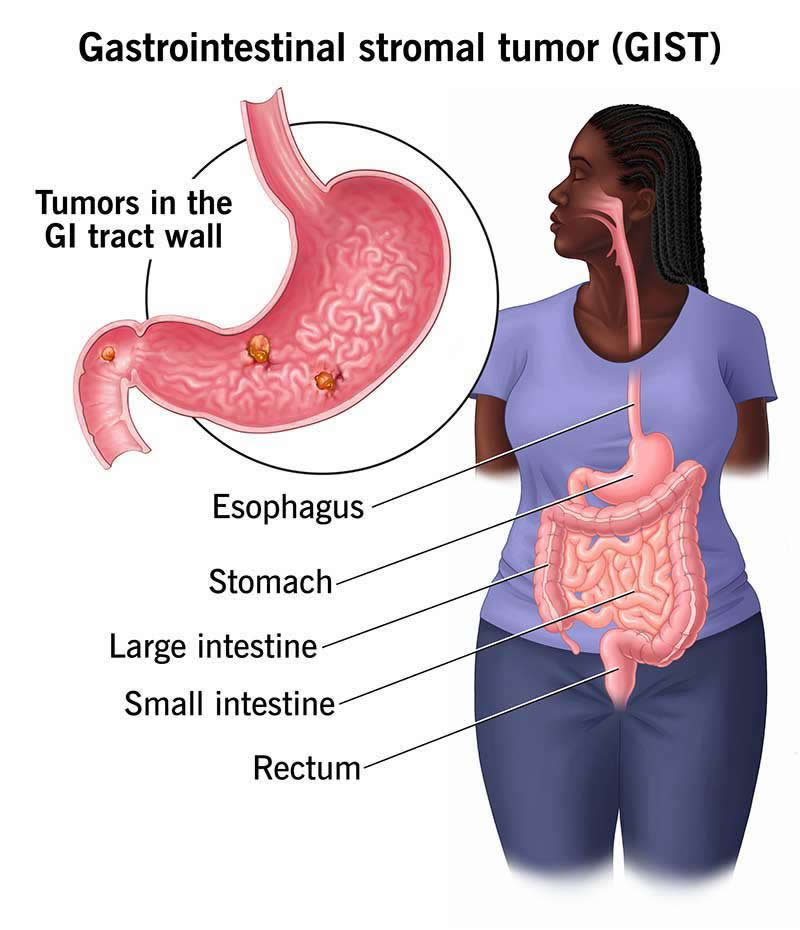Gastrointestinal Stromal Tumor (GIST)
Gastrointestinal stromal tumors (GISTs) are rare cancerous tumors in your digestive system. They may not cause symptoms. But when they do, symptoms may include belly pain, blood in your poop and vomiting blood. Surgery to remove a GIST is the most common treatment. In some cases, surgery cures the condition. But these tumors can come back.
What Are Gastrointestinal Stromal Tumors (GISTs)?

GISTs are rare cancerous tumors. They’re a type of soft tissue sarcoma. The tumors develop in certain cells known as the interstitial cells of Cajal, which are in the wall of organs in your gastrointestinal tract. The tumors typically form in your stomach or small intestine in your gastrointestinal tract.
Some gastrointestinal stromal tumors are small, about the size of a pencil eraser. Smaller tumors may not cause symptoms. Some GISTs can grow large enough to cause symptoms like abdominal pain, fatigue and nausea. Healthcare providers treat GISTs with surgery to remove the tumors.
Symptoms and Causes
Symptoms of gastrointestinal stromal tumors
This condition may not cause symptoms. Often, people learn they have a GIST when they have a test or surgery for another reason. When symptoms develop, they may include:
- Abdominal (belly) pain
- Blood in your poop
- Constipation
- Fatigue
- Losing weight without trying
- Loss of appetite
- Vomiting blood
GIST causes
This condition usually happens when the KIT gene changes. The change causes cells to produce a protein (KIT CD117). This protein causes cells in your gastrointestinal tract to multiply and form tumors. The genetic change may happen during your lifetime. But you may develop GIST if you inherit a tumor disorder that increases your risk, including:
- Carney-Stratakis syndrome: This rare condition may increase your risk of developing a GIST.
- Familial GIST syndrome: Rarely, abnormal KIT genes may be passed on from parent to child. This can increase your chances of developing GISTs. If you have familial GIST syndrome, you may develop GIST at a young age. And you may have more than one tumor.
- Neurofibromatosis type 1: This disorder causes certain cells to multiply and form tumors. You may have tumors all over your body.
Diagnosis and Tests
How doctors diagnose this condition
A healthcare provider will ask you about your symptoms and how long you’ve had them. They’ll do a physical exam. They may also do tests, including:
- Upper endoscopy
- CT scan
- PET scan
- Biopsy, to get tissue samples that a pathologist will examine under a microscope
Management and Treatment
How are gastrointestinal stromal tumors treated?
Treatment may be a combination of surgery and targeted therapy. Surgery may be the only treatment you need if you have small tumors. But you may have targeted therapy before surgery to shrink a large tumor.
Outlook / Prognosis
What can I expect if I have a GIST?
Treatment can ease your symptoms and sometimes cure a gastrointestinal stromal tumor. But a GIST may come back. You may have follow-up appointments every three to six months so your oncologist can look for signs of a new GIST. They may do tests, including:
- CT scans of your liver and pelvis
- MRI scans
- PET scans
What’s the survival rate for someone with GIST?
Overall, 85% of people with GIST are alive five years after diagnosis. Other survival rates are:
| Tumor location | Five-year survival rate |
|---|---|
| Local — the tumor didn’t spread from where it started | 95% |
| Regional — the tumor spread to nearby tissues and organs | 84% |
| Distant — the tumor is in more distant areas of your body | 52% |
| Tumor location | |
| Local — the tumor didn’t spread from where it started | |
| Five-year survival rate | |
| 95% | |
| Regional — the tumor spread to nearby tissues and organs | |
| Five-year survival rate | |
| 84% | |
| Distant — the tumor is in more distant areas of your body | |
| Five-year survival rate | |
| 52% |
Cancer survival rate data can be confusing. You may feel anxious about your situation. It’s important to remember that a survival rate is an estimate, not a prediction. Ask your oncologist to explain what you can expect.
A note from Wockr
Gastrointestinal stromal tumors (GISTs) may not cause symptoms. If they do, you might assume that you have the stomach flu or an upset belly from something you ate. It may come as a shock to learn that a rare cancerous tumor is why you don’t feel well. Treatment can often ease your symptoms and cure GIST. If you have this type of tumor, take some time to learn about this rare disease. You’ll have questions, and your healthcare team will be there with answers, support and more.